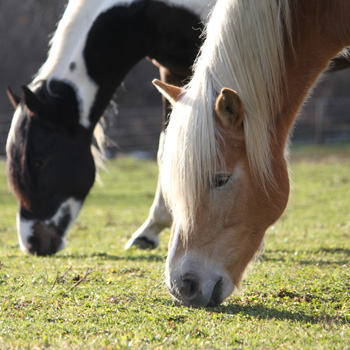Horse Health Quiz; Test Your Knowledge

1. What
a. Pastern Dermatitis (scratches)
b. Parasite infestation
c. Hypothermia
d. All of the above
2. What should you do to minimize mosquitoes?
a. Clean gutters
b. Minimize mud
c. Eliminate standing water
d. All of the above
3. What are four of the most common effect of equine sleep deprivation?
a. Irritability/excitability, joint disease, narcolepsy, and decreased immunity
b. Acting up under saddle, loss of appetite, hearing loss, and poor hoof quality
c. Nosebleeds, abscessed, dry skin, and excess shedding
d. Cushing's syndrome, cribbing, blood disorders, and back pain
4. EPM (Equine Protozoal Myeloencephalitis) is caused by ingestion of the infective sporocysts found in the opossums and other wildlife. What percentage of horses show signs of the disease?
a. Greater than 20%
b. 12% of all horses exposed
c. Less than 1%
d. 37%
5. What are the five most effective methods of controlling internal parasites?
a. Rotational-worming, minimizing contact with other horses, and cleaning paddocks
b. Spreading manure, using herbicides on fields, and feeding garlic supplements
c. Minimizing mud, periodic fecal analysis, and remove manure from fields and paddocks
d. Ask your vet to tube-worm your horse, turn out the barn lights at night, and play rock music (parasites prefer country music)
Answers:
- D. All of the above. We know mud isn’t a good thing, but mud is responsible for a host of health problems, including pastern dermatitis, parasite infestation, and even hypothermia, especially in foals or senior horses. Check out our Mud Management By RAMM to fix your muddy spots once and for all.
- D. All of the above. Mosquitoes are a chronic problem and are transmitters of many equine diseases, but they must have standing water to lay their eggs. Do your best to eliminate standing water and fight back with fly and mosquito control systems.
- A. Irritability/excitability, joint disease, narcolepsy, and decreased immunity are all common effects of equine sleep deprivation. Help your horse get a good night’s sleep by making his stall a comfortable place to rest.
- C. Less than 1% of horses will ever show signs of EPM even though most have had some sort of exposure throughout their lives.
- C. Minimizing mud, periodic fecal analysis, and remove manure from fields and paddocks. We know that periodic fecal analysis will determine the right anthelmintic to use and how often. Removing manure altogether is always preferable. Parasites love mud so consider switching troughs to the drinking post waterer. Feed hay off the ground wherever possible.
